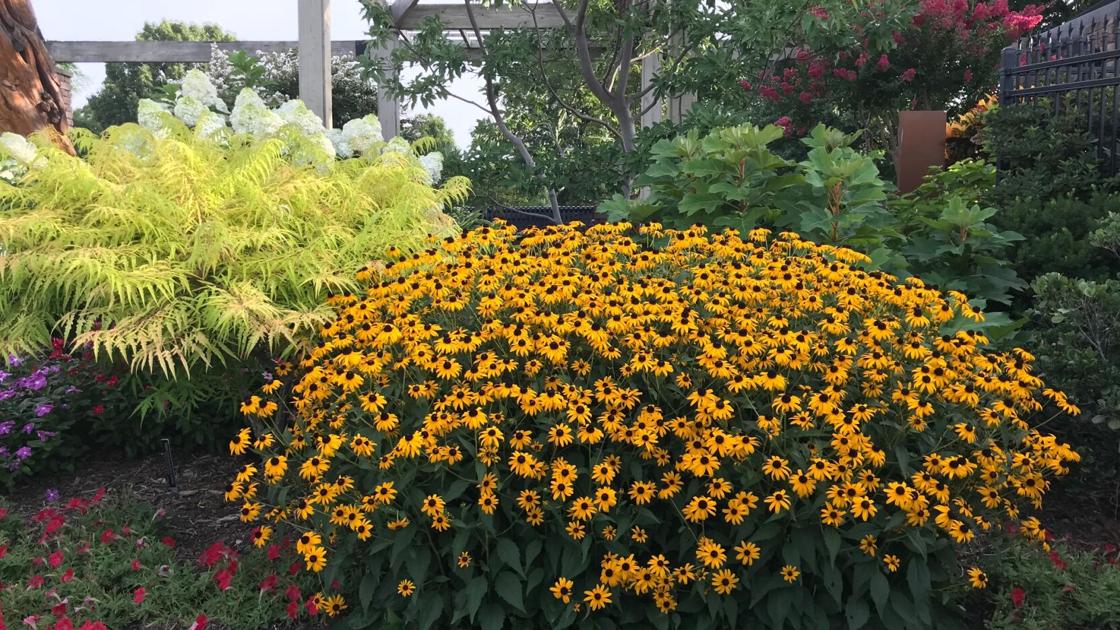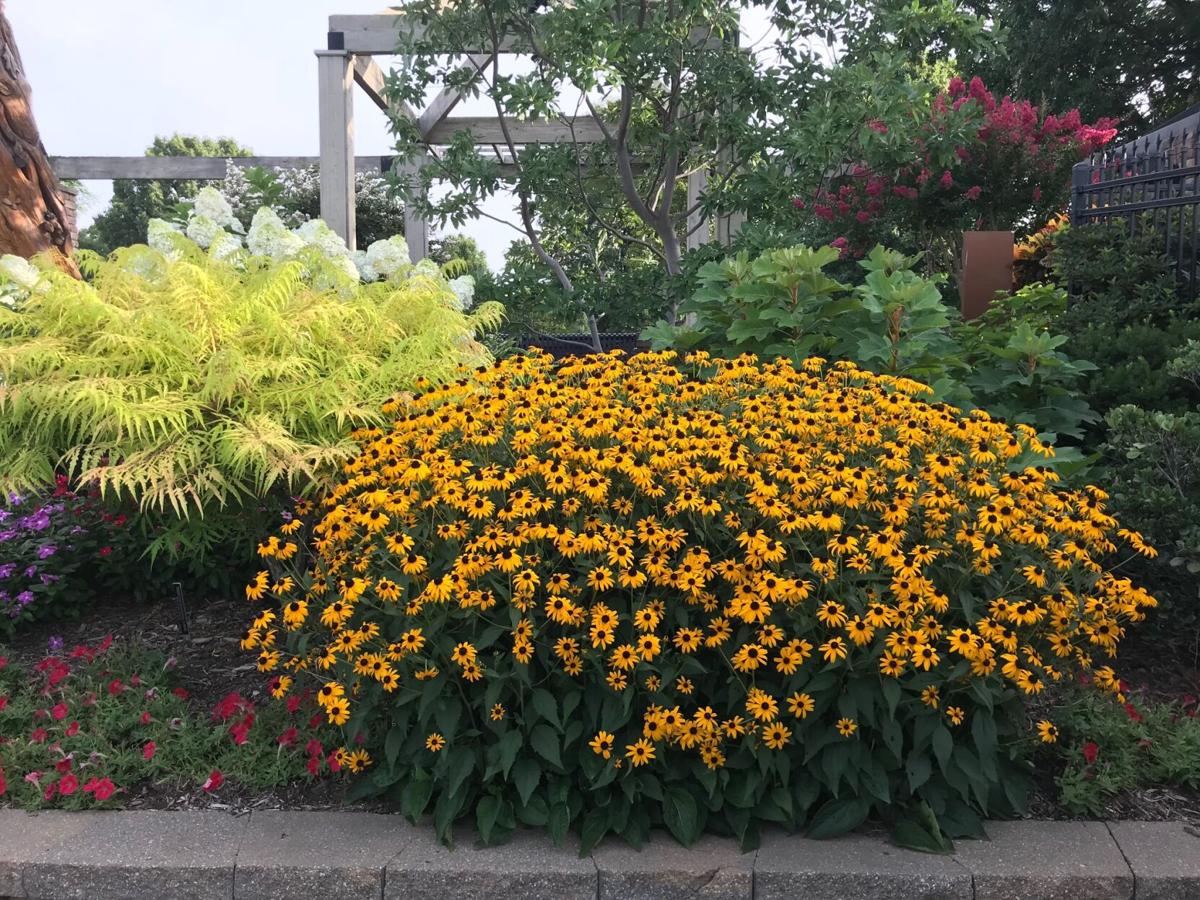

Goldsturm Rudbeckia blooms consistently throughout summer and early fall.
Safely slumbering beneath a thick blanket of Hershey-brown pine straw in my garden, dormant perennials patiently wait for nature’s signal to spring back to life.
Nothing stirring, I thought as I recently peered through frost-covered dining room windows at a perennial border that surrounds my back patio. Within a few short weeks, however, that will all change.
Patches of pine straw will magically begin to rise on the shoulders of awakening perennials seeking light. Colorful hostas will be among the first to send up light-hungry new sprouts. Astilbes, ferns and coral bells will quickly follow. Weeks later, the rustic brown mulch will completely disappear under a lush covering of green, gold and red perennial foliage. And best of all, one of our worst winters ever will fade from memory.
I’m reminded of an Old Testament verse from the Song of Solomon that celebrates spring: “Flowers spring-up on the earth, the season of singing has come, the cooing of doves is heard in our land.”
I’ve been hugely blessed to observe the seasonal plant cycles of birth, dormancy and rebirth play out in my garden for 40-plus years. It’s magical! John Denver captured the moment with these famous lyrics: “Sunshine on my shoulders makes me happy; sunshine in my eyes makes me cry; sunshine on the water looks so lovely; sunshine almost always makes me high.” And what a high it is when, like bears coming out of winter hibernation, we gardeners return to our spring gardens to again feel soothing sunlight on our shoulders.
If you are not yet a perennial plant enthusiast, I encourage you to give them a try. But be advised: perennials are addictive, much like potato chips. You can’t stop with just one. Here is my short list of “can’t-fail” perennials.
Daylily: Any perennial capable of surviving unattended along a country road or in an abandoned cemetery simply must be front-and-center in my garden. I especially enjoy growing old ever-blooming varieties such as Stella De Oro, Black Eyed Stella, Happy Returns and Morning Dawn. They tend to be inexpensive and faithful performers over many years. I grow 50-plus daylily varieties. Even so, I’ve only scratched the surface. There are more than 60,000 daylily varieties!
Perennial salvias: I’ve lost track of all the perennial salvias I’ve grown over the years. They are as tough as they are beautiful, and they come in many vivid flower colors: deep purple, sky blue, red, pink and white. I’m particularly fond of the blue and purple flowering varieties. They play an important role of toning down hot red and yellow flowering perennials in a mixed border. While scores of new hybrid varieties appear on the nursery scene each spring, one can never go wrong planting the great old treasures: May Night and Blue Hill.
Rudbeckia: I became an instant fan of Rudbeckias years ago when the variety Goldsturm first appeared. I have a large clump of long-lived Goldsturm Rudbeckias in my garden that has produced masses of bright yellow summer flowers for 20 straight years. And they have achieved this impressive record with very little care from me. Goldsturm blooms consistently throughout summer and early fall. It’s one of only a few perennials that can match the best annuals for seasonlong flower production.
Echinacea: And, of course, one simply must include sun-loving cone flowers (echinacea) in the garden. Like Rudbeckias, they bring a seasonlong blessing of flowers and require very little maintenance. The long-stemmed beauties make perfect cut flowers for indoor decorating. And they are irresistible to butterflies, bees and other pollinators. Hot new varieties hit the market each year, and one can’t go wrong planting any of them. That said, I’m especially fond of the old rosy-pink flowering Magnus variety that so faithfully performs in my garden.
Hosta: Considered by many to be the queen of shade-loving perennial plants. And I take no issue with that. I proudly grow 40-plus varieties in my garden, and I lust for at least that many more. And with endless varieties to select from (well more than 2,000) there is a flower color, foliage pattern and plant size to suit any garden. While I am reluctant to weigh in on the “best” varieties, I can — based on first-hand experience — highly recommend the following: Dancing Queen (gorgeous yellow foliage that lasts all summer), August Moon, Empress Wu (can easily grow to 6 feet in diameter!) Blue Angel and Sagae.
What the Ale: Beer of the Week, Renaissance Brewing Co.’s Dragon’s Breath
Meet 41 adoptable dogs and cats looking for love in the Tulsa area
Apollo

Meet Apollo! He is a beautiful 3-year-old German Shepherd who gets along with all other dogs and kids! He is very smart and wants to please. He has an overall sweet personality and while he loves romping in the backyard, he really loves snuggling on the couch! Apollo is house- and crate-trained and is fully vaccinated, neutered and microchipped. Apollo is available for adoption through Compassionate Animal Rescue Efforts.
To inquire, visit the Compassionate Animal Rescue Efforts website at carerescueok.org.
Photo provided by CARE
Minnie

Sweet Minnie Mouse is going to make her adopter an extremely loyal, loving companion! She loves all humans equally, even the tiny ones. Curling up in your lap or on your chest is her favorite activity and she could stay in your arms all day. She likes to be carried around like the queen she is and won't leave your side all day if given the opportunity. Unfortunately, her last family moved out of their house and left her outside. She was found a month later, emaciated and weak, but is still trusting of humans. She hopes her next home will be her forever home.
Minnie does great with people of all ages, but she is not a fan of other cats. She could probably live with a calm dog if given a slow introduction.
HOW TO ADOPT MINNIE
The Tulsa SPCA is currently operating on an appointment-only basis.
• Visit tulsaspca.org/adoptable-cats. Click on her profile and use the orange "Interested in this animal? Click here!" button to apply to adopt.
• If you're approved, we'll contact you to finalize the paperwork, collect payment and arrange an appointment for your drive-thru adoption.
• Please stay home if you feel unwell, especially if you are experiencing symptoms of fever, cough or sore throat.
All available Tulsa SPCA pets can be viewed at tulsaspca.org.
TomTom

TomTom is a very cool little guy — more of a pocket pit! He has beautiful fawn coloring. TomTom is crate-trained and is such a patient pup. He loves running outside but is not crazy about the cold weather. Because of his old and new injuries when he was found, we would say he would do best being an only dog for now and no kitties. He’s a super sweet dog that just wants love and a home! TomTom is fully vaccinated, neutered and microchipped and is available for adoption through Compassionate Animal Rescue Efforts.
To inquire, visit the Compassionate Animal Rescue Efforts website at carerescueok.org.
Photo provided by CARE
Munchkin

Munchkin is a female brown tabby with an estimated birthdate of 11/1/2018. She is quiet and laidback but in the past she loved to be petted and combed. She was adopted with Stump in September 2020 but the adoption didn't work out well, possibly because the cats were shy and not outgoing and also afraid of their larger-size dog. She needs a quiet home with someone who can be patient with her until she adjusts to her new surroundings and can probably be the only pet in the home. At least at this time she is not a lap cat.
All cats have tested negative for FeLeuk/FIV and are current on rabies and FVRCP vaccinations. All StreetCats kitties have Home Again microchips implanted and are registered at no charge to the owner.
Adoption inquiries can be made at StreetCats, 60th Street and South Sheridan Road, or email cats@streetcatstulsa.org. To see more StreetCats, visit streetcatstulsa.org.
Photo provided by StreetCats
Boo

My name is Boo and I’m mostly a lounge act with a playful side. I made a name for myself on the streets and found a dashing older dog during my travels. I took the initiative and tried to move in with him, unfortunately his elderly owner wasn’t in the position to take in a younger gal like myself. However, I have since learned, the elderly woman and my current foster mom were in cahoots to end my gypsy ways. Turns out I happen to fancy being a house dog and one that excludes cats. There’s just something about how they skulk around acting like they want to play, but I discovered they are all frauds. They don’t really want to play, and they get all high and mighty when I try. Talk about mixed signals!
Anyway, I’m 3 years old, spayed, vetted, microchipped, house-trained and crate-trained and would very much like to have a family of my own. My foster friend got adopted, so life is pretty lonely nowadays. I promise to greet you every day with a smile and I aim to please. Especially if there’s a bully stick involved because those are my favorite! Boo is available for adoption through Compassionate Animal Rescue Efforts.
To inquire, visit the Compassionate Animal Rescue Efforts website at carerescueok.org.
Photo provided by CARE
Ezekiel

Ezekiel was originally brought to us to be neutered as a TNR cat but thanks to his charming personality, we were able to take him into our care to adopt out as an indoor companion. He is currently living in the office of staff members and is enjoying all the people who greet him and give him snacks daily. He is a low-maintenance boy, content to lounge in a comfy pet bed for much of the day. He is extremely passionate about canned food and will vocalize when he thinks it's time to eat. If you're looking for an easy cat with personality, Ezekiel is your kitty!
Ezekiel is FIV+, likely from being unaltered and living outdoors before we were able to rescue him. He is currently healthy and as long as he is kept inside and up to date on vet care, shouldn't have any complications from here on out.
Ezekiel is about 3 years old and has been neutered, vaccinated, microchipped, FELV/FIV tested, and is current on parasite prevention.
HOW TO ADOPT EZEKIEL
The Tulsa SPCA is currently operating on an appointment-only basis.
• Visit tulsaspca.org/adoptable-cats. Click on his profile and use the orange "Interested in this animal? Click here!" button to apply to adopt.
• If you're approved, we'll contact you to finalize the paperwork, collect payment and arrange an appointment for your drive-thru adoption.
• Please stay home if you feel unwell, especially if you are experiencing symptoms of fever, cough or sore throat.
All available Tulsa SPCA pets can be viewed at tulsaspca.org.
Button

Little Button came to us not long ago with her sister Bow. She is approximately 9 weeks old and a lab/border collie mix (we think!). She is very sweet, playful and already listening well for one so young!
She is used to being around big dogs and, as most puppies, should do well with cats. Kids and puppies are just a given! This adorable baby will make the right family a wonderful addition! Button will be fully vaccinated and microchipped and her adoption will cover her spay procedure when she gets a few months older. Button is available for adoption through Compassionate Animal Rescue Efforts.
To inquire, visit the Compassionate Animal Rescue Efforts website at carerescueok.org.
Photo provided by CARE
Lucky

Lucky has a huge personality! She is quite the diva and wants to be the center of your attention. She is not a fan of other animals and needs to be the only pet in the home. Lucky loves treats, playing with toys and attention from her humans. She'd do best in a home with cat experience and looks forward to being your new best friend!
Lucky is about 4½ years old and has been spayed, vaccinated, FeLV/FIV tested (negative), microchipped and is current on parasite prevention.
HOW TO ADOPT LUCKY
The Tulsa SPCA is currently operating on an appointment-only basis.
• Visit tulsaspca.org/adoptable-cats. Click on her profile and use the orange "Interested in this animal? Click here!" button to apply to adopt.
• If you're approved, we'll contact you to finalize the paperwork, collect payment and arrange an appointment for your drive-thru adoption.
• Please stay home if you feel unwell, especially if you are experiencing symptoms of fever, cough or sore throat.
All available Tulsa SPCA pets can be viewed at tulsaspca.org.
Kiko

Kiko was found by a Good Samaritan as a stray dog. It’s thought that he was hit by a car from how he was walking. But after visiting a local animal clinic, the veterinarian believes he has been involved in a car accident in the past but he is now healed up. During further examination, the doctor found poor Kiko is full of buckshot from being shot at by horribly cruel humans.
Kiko has been in a wonderful foster home with another dog, where he loves all people despite having every reason not to be accepting. He’s ready to find his forever family. He will need a tall fence since his wandering days are over!
Kiko is what we call a gentle giant and is believed to be 6-7 years old. Kiko is house-trained and knows commands. He does well with other dogs, but as of yet, we are not sure about cats. He is fully vaccinated, neutered and microchipped. Kiko needs to be loved as much as he loves people and he is available for adoption through Compassionate Animal Rescue Efforts.
To inquire, visit the Compassionate Animal Rescue Efforts website at carerescueok.org.
Photo provided by CARE
Loki and Simba

Loki (left) and Simba are a bonded pair of males with an estimated birthdate of 3/22/2020. They are black and white. Loki sometimes walks a little strangely due to something that happened in his first home, but he gets around just great and runs and plays. He was X-rayed at Feline Specialties and nothing was identified as a problem. Simba probably has a tear duct blocked in his right eye, so he does have some discharge from that eye, but it only needs to be wiped daily with a warm washcloth. He does have eye drops if needed. Both cats are very sweet and loving, although a little shy at first. They came to StreetCats because of an apartment fire and their owners had to move and could not keep them. They have not been around children but are OK with dogs and other cats. These two really need a loving home together as the first year of their lives wasn’t so great until coming into StreetCats.
All cats have tested negative for FeLeuk/FIV and are current on rabies and FVRCP vaccinations. All StreetCats kitties have Home Again microchips implanted and are registered at no charge to the owner.
Adoption inquiries can be made at StreetCats, 60th Street and South Sheridan Road, or email cats@streetcatstulsa.org. To see more StreetCats, visit streetcatstulsa.org.
Photo provided by StreetCats
Emerald

Emerald is a fun-loving puppy! She had a very rough beginning to life, being surrendered with her brother (RIP) to our local animal shelter very sick with Parvo. Emerald was able to survive this deadly virus due to generous donors and an educated veterinary staff. She is approximately 3 months old now and has beat a deadly virus, so she is one strong pup! She loves to play with toys, enjoys a good puppy chew bone and prefers to curl up in her person's lap. She is ready for her forever home! Emerald will be fully vaccinated, spayed and microchipped at the appropriate age. Emerald is available for adoption through Compassionate Animal Rescue Efforts.
To inquire, visit the Compassionate Animal Rescue Efforts website at carerescueok.org.
Photo provided by CARE
Mr. Jiji

Mr. Jiji is a handsome 7-year-old male domestic short hair cat weighing about 13 pounds. He is black with tuxedo markings and bright green eyes. Jiji is an indoor-only cat who always uses his litter box. He loves watching birds, squirrels and bunnies from his sunny indoor window perch and enjoys being petted and spending time with his people.
He is a social butterfly and very playful — he loves people and other animals, especially small cat-friendly dogs. When he was a kitten, his best friend was a bearded dragon! Because of this we think Mr. Jiji would do well in a wide variety of homes!
Mr. Jiji has been spayed, vaccinated, microchipped, FELV/FIV tested (negative) and is current on parasite prevention.
HOW TO ADOPT MR. JIJI
The Tulsa SPCA is currently operating on an appointment-only basis.
• Visit tulsaspca.org/adoptable-cats. Click on his profile and use the orange "Interested in this animal? Click here!" button to apply to adopt.
• If you're approved, we'll contact you to finalize the paperwork, collect payment and arrange an appointment for your drive-thru adoption.
• Please stay home if you feel unwell, especially if you are experiencing symptoms of fever, cough or sore throat.
All available Tulsa SPCA pets can be viewed at tulsaspca.org.
Lucas

Look at that award-winning smile! Lucas flashes it all the time outside, where he enjoys playing with toys, being chased through the yard or just sniffing around. He's never smiling in his kennel though where he spends most of his day. Lucas is one of those sweet dogs who just can't stand being cooped up at the shelter and is finding the whole experience extremely stressful and depressing. He would like to get out of the shelter as soon as possible by going into a foster or forever home!
Lucas doesn't seem reactive to other dogs and already seems to have some basic training on board but can be very pushy and jumpy at certain times.
At 2 years old and 53 pounds, Lucas is a lovely size, especially since much of his weight is a soft, silky golden coat! Because Lucas can be a lot when he is stressed or excited, he is looking for a family without children younger than 12. He has been neutered, vaccinated, heart worm tested (negative), microchipped and is current on parasite prevention.
HOW TO ADOPT LUCAS
The Tulsa SPCA is currently operating on an appointment-only basis.
• Visit tulsaspca.org/adoptable-dogs. Click on his profile and use the orange "Interested in this animal? Click here!" button to apply to adopt.
• If you're approved, we'll contact you to finalize the paperwork, collect payment and arrange an appointment for your drive-thru adoption.
• Please stay home if you feel unwell, especially if you are experiencing symptoms of fever, cough or sore throat.
All available Tulsa SPCA pets can be viewed at tulsaspca.org.
Photo provided by Tulsa SPCA
Izzy

Izzy was surrendered through no fault of her own. She is quiet, affectionate and is used to a quiet, calm household. She has successfully lived with other cats. She is litter box trained and would make a lovely companion for someone in a peaceful home.
Izzie is about 8 years old and has been spayed, vaccinated, FELV/FIV tested (negative), microchipped and is current on parasite prevention.
HOW TO ADOPT IZZY
The Tulsa SPCA is currently operating on an appointment-only basis.
• Visit tulsaspca.org/adoptable-cats. Click on her profile and use the orange "Interested in this animal? Click here!" button to apply to adopt.
• If you're approved, we'll contact you to finalize the paperwork, collect payment and arrange an appointment for your drive-thru adoption.
• Please stay home if you feel unwell, especially if you are experiencing symptoms of fever, cough or sore throat.
All available Tulsa SPCA pets can be viewed at tulsaspca.org.
Honey

Meet Honey! She is the perfect lady! Honey was adopted back in 2018 after having a beautiful litter of puppies. She was recently returned as her family was having medical issues and could no longer take care of her. She hasn’t skipped a beat and really just loves to lounge around with the random romp in the backyard! She is amazing with children, other dogs and hasn’t paid much attention to the cats either. This girl turns 8 years old this year and is ready for a chill home environment to spend her days. Honey is fully vaccinated, spayed and microchipped and is available for adoption through Compassionate Animal Rescue Efforts.
To inquire, visit the Compassionate Animal Rescue Efforts website at carerescueok.org.
Photo provided by CARE
Maddie

Maddie is a 5-month-old SharPei mix who, according to her foster mom, is the sweetest dog and has the best personality! She loves people, loves other dogs and even gets along with the cats! Maddie loves to cuddle and sleep right next to you. She's a bit of a princess because she wants all the attention! She is doing well in her potty training also. This is one sweet girl who wants to be your forever pup! Maddie’s adoption covers being fully vaccinated and microchipped and her adoption will cover her spay procedure when she gets a one month older. Maddie is available for adoption through Compassionate Animal Rescue Efforts.
To inquire, visit the Compassionate Animal Rescue Efforts website at carerescueok.org.
Photo provided by CARE
Kavik

Hi! My name is Kavik (it means Wolverine), but I am far from. I am the sweetest boy of my siblings. I love soft blankets and being held. I’m not a small boy at just 13 weeks and almost 30 pounds. I am said to be a huskador (husky and lab mix), but I have the coolest colors of my pack. I love to play with my siblings, and I even try to play with the cats. And my foster mom says I have been super good with my potty training because I haven't made one mess in the house! I would love to come play at your house too! Kavik will be neutered, microchipped and fully vaccinated in the coming month. Kavik is available for adoption through Compassionate Animal Rescue Efforts.
To inquire, visit the Compassionate Animal Rescue Efforts website at carerescueok.org.
Photo provided by CARE
Thunder

Thunder is believed to be 7 years old, crate trained and almost house broken. Thunder had a rough life before, but he is very playful and loves to play fetch and snuggle on the couch. He is approximately 30 pounds and we think he is a Shiba Inu terrier mix. Thunder is fully vaccinated, neutered, microchipped and is available for adoption through Compassionate Animal Rescue Efforts.
To inquire, visit the Compassionate Animal Rescue Efforts website at carerescueok.org.
Photo provided by CARE
Sesi

Hi, my name is Sesi (it means snow) and I have a BEAUTIFUL solid white coat. I’m the only girl of my litter, and my foster ma says it’s a tough job, as I demand all the love (which I get, of course). I’m a sweet girl and love to play. I’ll do anything for a treat, even sit and lay down, which at 10 weeks old, I hear that’s an accomplishment. I’m told I’m a huskador (husky/lab mix), so obviously I’m very smart and playful.
Sesi is a young pup and will be vaccinated, spayed and microchipped at the appropriate age. Sesi is available for adoption through Compassionate Animal Rescue Efforts.
To inquire, visit the Compassionate Animal Rescue Efforts website at carerescueok.org.
Photo provided by CARE
Buddy

This dapper gent is Buddy, a 7-year-old Staffordshire Terrier/Boston Terrier mix. He is friendly to people and other dogs but likes to chase cats. Buddy is almost deaf and needs an understanding family who can help him with the anxiety hearing loss can cause. Even though he's friendly with dogs, he is protective of food. Buddy is looking for a home where he can be the only dog or where he can be fed separately.
Email animalaidoftulsa@gmail.com for more information or to schedule a meet and greet.
Visit animalaid.org for a complete list of adoptable pets through Animal Aid of Tulsa.
Noriko Walters/Animal Aid of Tulsa
Bruno

Bruno is about a year old. He is very sweet and does well with other dogs, cats and kids.
Bruno’s adoption fee is $125, which includes his neuter, up-to-date vaccinations and microchip.
Email animalaidoftulsa@gmail.com for more information or to schedule a meet and greet.
Visit animalaid.org for a complete list of adoptable pets through Animal Aid of Tulsa.
Mackensie S./Animal Aid of Tulsa
Delilah

Delilah is a 3-year-old pittie mix that is available for adoption through Altruism, Inc. She is spayed, up to date on vaccines, heartworm negative and on prevention. Delilah would do best in a home without small children. She loves everyone but is strong and energetic when she is playing. Mostly, she wants to lounge around and be spoiled! She has been working with a trainer and is improving her command-following skills. She will sit on command and is very food motivated. Her adoption fee is $100. Email jlthorn824@gmail.com to inquire.
All available pets through Sapulpa Furry Friends can be viewed here.
Angela Ewers/Sapulpa Furry Friends
Gloria

Smart and silly, Gloria is the perfect combo! This 2-year-old cattle dog mix is always up for a fun walk, a game of fetch, a nice chew or to learn a new trick. Gloria absolutely loves to play, but she can be serious when she needs to be — look at that laser focus in her eyes! She takes cues well and is quick to pick up on what's requested of her. She would do best in a family with older children (8+) who want to include her in their active lifestyle. Gloria has been spayed, vaccinated, microchipped and is current on parasite prevention.
HOW TO ADOPT GLORIA
The Tulsa SPCA is currently operating on an appointment-only basis.
• Visit tulsaspca.org/adoptable-dogs. Click on her profile and use the orange "Interested in this animal? Click here!" button to apply to adopt.
• If you're approved, we'll contact you to finalize the paperwork, collect payment and arrange an appointment for your drive-thru adoption.
• Please stay home if you feel unwell, especially if you are experiencing symptoms of fever, cough or sore throat.
All available Tulsa SPCA pets can be viewed at tulsaspca.org.
Photo provided by Tulsa SPCA
Percy

Percy was one of the many dogs displaced by the flooding in Oklahoma. He now lives in the house, loves his crate and has not had one accident in the house. He even understands what “potty” means, sits on command, comes when called, walks great on a leash and has learned the commands “stop that” and “kennel up.” He’s so happy to be with children and he’s just happy to be with people! Percy is a gentle soul and a tender spirit. He is approximately 4 years old and is believed to be a lab/mastiff mixed breed. Percy is fully vaccinated, neutered, microchipped and is available for adoption through Compassionate Animal Rescue Efforts.
To inquire, visit the Compassionate Animal Rescue Efforts website at carerescueok.org.
Photo provided by CARE
Breezy

This is Breezy. She is 10 years old and truly the sweetest girl! She loves everyone — humans, dogs and even cats. She loves to go on walks and is good on the leash. Breezy is so very young at heart. She sits for treats and is working on stay and is even easy to bathe! In the words of her foster mom — “She is a dream!” If you give this older girl a chance, you won’t regret it! Breezy is spayed, microchipped, fully vaccinated and is available for adoption through Compassionate Animal Rescue Efforts.
To inquire, visit the Compassionate Animal Rescue Efforts website at carerescueok.org.
Photo provided by CARE
Lupen

Lupen is a 1-year-old who gets along great with other dogs and loves to wrestle and play. He knows how to sit and lay down. He is fearful of new people, but with the right person who is willing to be patient with him, he will be your best friend. Unfortunately, he is more fearful of men; however, once he learns to trust as he has with his foster's brother, he will reciprocate. From his foster mom: "Lupen is a complete goofball. Belly rubs are his favorite kind of love, and he’s more than happy to curl up in bed with you. If you don’t mind, he will thank you with lots of kisses and wet willies. He has lots of energy so he will do best with someone willing to play with him on a daily basis. Lupen is currently living with a 10-year-old girl so we feel he will do well with or without kids in the home. He is crate-trained and does best when he has a toy to entertain him. Lupen has not been cat tested, but he is interested in birds in his yard." His current foster says he is a sweet little guy and has made great progress in their home. We are looking for a family that will be patient and loving. Lupen is neutered, microchipped, fully vaccinated and is available for adoption through Compassionate Animal Rescue Efforts.
To inquire, visit the Compassionate Animal Rescue Efforts website at carerescueok.org.
Photo provided by CARE
Eleanor

Meet Eleanor! She is a young mama that was found on the streets trying to protect her three young babies and did a good job of it! Now, she and her puppies are ready for their forever homes! She is a 1-year-old mix with some beautiful coloring and she weighs about 60 pounds. Her foster mom says she is very sweet and super eager to please. She has lots of energy and loves to run. Eleanor does well in the house and is learning that she doesn't have to steal food to survive any longer. Her foster mom says she is very playful and always wants to be with and around the family with kids. She will sit and shake for a treat! Eleanor is spayed, microchipped, fully vaccinated and is available for adoption through Compassionate Animal Rescue Efforts.
To inquire, visit the Compassionate Animal Rescue Efforts website at carerescueok.org.
Photo provided by CARE
Mr. Heckles

My name is Mr. Heckles, but my friends just call me Heckles. I’m a lifer here at CARE, meaning I was born into the rescue! I’m 2½ years old and so ready to find my forever family. I’m a little quirky, but I don’t think that means I don’t deserve an understanding family of my own. In fact, I’m patiently waiting for them to find me. I’m a pretty big guy weighing in at 91 pounds, and I’m a Great Pyrenees mix! I know how to sit, lay down, crawl, shake and even sit pretty! I walk well on a martingale collar too. I get a little nervous around new people and new dogs, but I do warm up. I may be a big guy, but I just can’t help that I get nervous, and I hope that doesn’t deter you from wanting to give me a shot. With my size, sometimes things scare me. I’m house- and crate-trained, and I think I would do best with grownups and bigger kids. The little ones sometimes have loud voices that make me nervous. I know that if I had a family that would love me and make me feel safe, I would be the very best loyal companion for my whole life. I really like to play fetch and go for car rides! Those are the best! But you know what’s better than a car ride? BELLY RUBS AND BEING BRUSHED! Boy do i love belly rubbins! If you want to meet me, please apply for me at carerescueok.org.
Mr. Heckles is fully vaccinated, neutered, microchipped and is available for adoption through Compassionate Animal Rescue Efforts.
Photo provided by Snoots Pet Photography
Oakley

Oakley is a 3-year-old male mastiff mix who is available for adoption through a private foster, sponsored by Altruism Inc. rescue. He loves the company of other dogs and is good with all people, but he would do best in a home with older children. Oakley is sweet, obedient and very smart! He knows many commands and has spent time in pup training. Based on his experience, it is believed that he needs a calmer home that has routine and structure. Oakley is neutered, up to date on vaccinations, heartworm negative and on prevention. Email jlthorn824@gmail.com to inquire further.
All available pets through Sapulpa Furry Friends can be viewed here.
Angela Ewers/Sapulpa Furry Friends
Archie

Are you looking for a running buddy? Archie is an energetic, playful, 4-year-old pit/lab mix who is looking for a foster or forever home! Archie would do best as an only pet in a home with older children.
Email animalaidoftulsa@gmail.com for more information or to schedule a meet and greet.
Visit animalaid.org for a complete list of adoptable pets through Animal Aid of Tulsa.
Noriko Walters/Animal Aid of Tulsa
Star

Star is full of joy and very well trained. While at CARE Rescue’s STAR Prison Dog Program, she recently passed AKC Beginner I training and gets along great with other dogs. Star is a true “star” and is an easy dog to love. Star is available for adoption through Compassionate Animal Rescue Efforts
To inquire, visit the CARE website at carerescueok.org.
Photo provided by CARE
Johnny

Johnny is about 2 years old but acts like a happy bouncing 3-month-old! And his fur is as soft as a pup's! Johnny is a timid little guy, loud voices and new things still frighten him, so slow and steady wins his heart. He is working on his basic commands and already walks well on leash but needs more confidence-building. He could have a doggie friend but still needs some work on proper play and sharing. If you need a friend that’ll keep you laughing, come meet Johnny! Johnny is fully vaccinated, neutered, microchipped and is available for adoption through Compassionate Animal Rescue Efforts.
To inquire, visit carerescueok.org.
Photo provided by CARE
Bonnie

Bonnie is a sweetheart! She’s about 3 years old and has a unique voice. Sometimes we call her the gremlin! She loves humans of all ages and sizes, and would love to have a child or two of her very own. Bonnie does not play well with other dogs or cats, so therefore she must be the only pet. But she has enough love for everyone! Bonnie is spayed, microchipped, fully vaccinated and is available for adoption through Compassionate Animal Rescue Efforts.
To inquire, visit the Compassionate Animal Rescue Efforts website at carerescueok.org.
Photo provided by CARE
Carlos

Carlos is approximately 18 months old and don’t let his size mislead you. This boy is possibly the most “chill” dog you will ever meet. He rarely barks, loves other dogs and is the perfect gentleman with a smile that will melt your heart. Carlos loves to give hugs and kisses if you let him, but mostly, he is simply looking or a family to love and to be loved. Carlos is comfortable in a crate but doesn’t mind getting in the car if you want a buddy to tag along. He even walks great on a leash. There are not enough wonderful adjectives to describe this sweet boy, but be assured he is as calm and well-behaved as any dog you will ever meet. Carlos is neutered, microchipped, fully vaccinated and is available for adoption through Compassionate Animal Rescue Efforts.
To inquire, visit the Compassionate Animal Rescue Efforts website at carerescueok.org.
Photo provided by CARE
Frankie

Frankie is about a year old and weighs 53 pounds. Frankie loves to be outside! On a walk, in the yard playing with his toys or just sunning his cute belly, Frankie loves the great outdoors. He has a great smile and loves to show it off to those he loves. Frankie would make a great dog for families with kids older than 12. He has been neutered, microchipped, vaccinated and is current on his parasite preventions.
HOW TO ADOPT FRANKIE
The Tulsa SPCA is currently operating on an appointment-only basis.
• Visit tulsaspca.org/adoptable-dogs. Click on his profile and use the orange "Interested in this animal? Click here!" button to apply to adopt.
• If you're approved, we'll contact you to finalize the paperwork, collect payment and arrange an appointment for your drive-thru adoption.
• Please stay home if you feel unwell, especially if you are experiencing symptoms of fever, cough or sore throat.
All available Tulsa SPCA pets can be viewed at tulsaspca.org.
Photo provided by Tulsa SPCA
Percy Lou

Percy is a middle-aged girl who, along with her sister, was dumped at a local high-kill shelter after years of neglect and overbreeding. With the support of many, Percy and her sister were rescued by CARE Rescue. Unfortunately, her sister didn’t make it due to a cancerous mass. But Percy has received noninvasive medical treatment and is now just looking for a soft place to lay her head. Along with years of neglect, Percy is a bit overweight and is simply looking for a family who will treat her well. In only a few weeks, Percy has begun to show her true personality, and she is showing bursts of playfulness. But after a little bit of attention and activity, she is ready to go to a soft place to rest. If you are looking for a girl who isn’t looking for lots of activity, Percy will show you all the love a girl can. It is believed she is approximately 7 years old but still has lots of life. After first being dumped at a shelter which was loud and hectic, then going to Woodland West Animal Hospital for medical care, Percy is now seeing that humans can be caring, and she has made many new friends despite recently losing her sister. Percy is spayed, microchipped, fully vaccinated and is available for adoption through Compassionate Animal Rescue Efforts.
To inquire, visit the Compassionate Animal Rescue Efforts website at carerescueok.org.
Photo provided by CARE
Taco

Visit available dogs at the Sapulpa Animal Shelter, 8812 W. 100th St. South in Sapulpa. You must visit the shelter in person to adopt an animal. No appointment is required, but please wear a mask into the building when you visit.
All available dogs and cats are spayed/neutered and vaccinated upon adoption.
Hours of operation are 9 a.m. to 5 p.m. Monday and Thursday, 9 a.m. to 5:30 p.m. Tuesday and Wednesday, and 8 a.m. to noon Friday.
All available pets through Sapulpa Furry Friends can be viewed here.
Angela Ewers/Sapulpa Furry Friends
Minnie

Visit available dogs at the Sapulpa Animal Shelter, 8812 W. 100th St. South in Sapulpa. You must visit the shelter in person to adopt an animal. No appointment is required, but please wear a mask into the building when you visit.
All available dogs and cats are spayed/neutered and vaccinated upon adoption.
Hours of operation are 9 a.m. to 5 p.m. Monday and Thursday, 9 a.m. to 5:30 p.m. Tuesday and Wednesday, and 8 a.m. to noon Friday.
All available pets through Sapulpa Furry Friends can be viewed here.
Angela Ewers/Sapulpa Furry Friends
Diego and Dora

Diego and Dora were found as strays together, and we don't know if they were raised together (they aren't very old), but they are bonded and seem to need each other!
Beautiful Dora is about a year old. Even being out on her own with her friend Diego, she has such a sweet, happy and easy-going manner. That's not to say she doesn't like to play because she does and still shows that puppyness! Diego has such a loving spirit and really loves being around people. He is a pretty chill guy most of the time but only being about 9 months old (he's a big guy), he still gets pretty excited about everything. Both of them do well with other dogs, always waggin their tails in welcome, and they seldom bark. They both know to wait to go potty outside and are very gentle taking treats and food.
This is from their trainer/foster: "DIEGO needs DORA more then she needs him. She will at least go potty without him, but then she wants right back in with him, and the reunion is as if they spent days apart. DIEGO, however, cannot function without his sister. They are so dependent upon each other, it’s sad to see them always looking for the other when I pull them one at a time to work with them. Their lives have not been very consistent, so the bond between them is even stronger. Having each other is something they could always count on. I feel like separating them would be detrimental to their psyche and would forever change who they are. There has to be someone out there, with 3 or 4 kids, that needs a couple of playful pups..."
We do offer a foster to adopt program and working with our trainers if you feel you have a home that would benefit from having a great "two for one" new family members! Visit carerescueok.org for our adoption application.
Diego and Dora are fully vaccinated, microchipped and Diego is neutered and Dora is spayed. Diego and Dora are available for adoption through Compassionate Animal Rescue Efforts.
To inquire, visit the Compassionate Animal Rescue Efforts website at carerescueok.org.
Photo provided by CARE
Lily

In June, our cruelty investigator picked up a thin dog with no fur at all. We can't imagine the pain poor Lily must have been in for so long; just touching her skin made it bleed. She was covered in scabs, bright pink and had many infected areas of her skin. While she had very little energy, Lily was a survivor and has been working hard on her health over these past 7 months. She is finally ready to find her forever family and begin moving on from her difficult first few years of life.
Currently in a foster home that reports Lily is a "huge source of joy and amusement," this shy but sweet girl is flourishing. She is well on her way to being potty- and crate-trained. She hasn't had an accident in her foster home in weeks and goes easily into her crate but does bark for a few minutes before settling down. Lily enjoys snuggling, chewing on hard bones and now has the energy for going on long walks.
Lily has played with other dogs and very much enjoys wrestling and rumbling hard, so much so that she can find it hard to stop playing when other dogs are around! She would do well in an only dog home or in a home with other dogs who enjoy a good hard romp and humans who could be proactive in reinforcing calm behavior when everyone is together.
Lily is around 3 years old, weighs 65 pounds, is heartworm positive and has not yet been spayed. As a big girl who can occasionally be jumpy mouthy when excited, she is looking for a home without children younger than 12 years of age. Having an intact animal in your home is an added responsibility that potential adopters should consider. She has been vaccinated, microchipped and is current on parasite prevention.
Because of the long road to recover that Lily is still on, she is being offered as a foster to adopt candidate. This comes with many benefits, such as access to our dog trainer and clinic, for Lily's needs! The Tulsa SPCA will continue to treat Lily medically until she is healthy enough to be spayed, after which the adoption will be finalized. We will also soon begin treatment for her heartworms, at no cost to her adopter.
Let us know if you are Lily's happily ever after!
HOW TO ADOPT LILY
The Tulsa SPCA is currently operating on an appointment-only basis.
• Visit tulsaspca.org/adoptable-dogs. Click on her profile and use the orange "Interested in this animal? Click here!" button to apply to adopt.
• If you're approved, we'll contact you to finalize the paperwork, collect payment and arrange an appointment for your drive-thru adoption.
• Please stay home if you feel unwell, especially if you are experiencing symptoms of fever, cough or sore throat.
All available Tulsa SPCA pets can be viewed at tulsaspca.org.
Photo provided by Tulsa SPCA
Lucian

HOW TO ADOPT LUCIAN
The Tulsa SPCA is currently operating on an appointment-only basis.
• Visit tulsaspca.org/adoptable-dogs. Click on his profile and use the orange "Interested in this animal? Click here!" button to apply to adopt.
• If you're approved, we'll contact you to finalize the paperwork, collect payment and arrange an appointment for your drive-thru adoption.
• Please stay home if you feel unwell, especially if you are experiencing symptoms of fever, cough or sore throat.
All available Tulsa SPCA pets can be viewed at tulsaspca.org.
Photo provided by Tulsa SPCA
12 months for just $26

"This is a special 'editor' offer at a rate we have not offered before. For just $26, you get unlimited access to everything on tulsaworld.com for a year. Every time you click on a story from social media you will get it without interruption and without surveys. Every story online + the daily e-edition that shows you the pages of the paper that day. Support our local journalists who work for you." — Tulsa World Editor Jason Collington
Broken Arrow man credits weight loss to 10,000 miles of dog walks
Barry Fugatt is director of horticulture at the Tulsa Garden Center and Linnaeus Teaching Garden. He may be reached by email: bfugatt@tulsagardencenter.org.
February 21, 2021 at 02:09AM
https://ift.tt/3qL0RWI
Barry Fugatt: Perennials are addictive, like potato chips. You can’t stop with just one. - Tulsa World
https://ift.tt/2rh4zOj
Potato
No comments:
Post a Comment